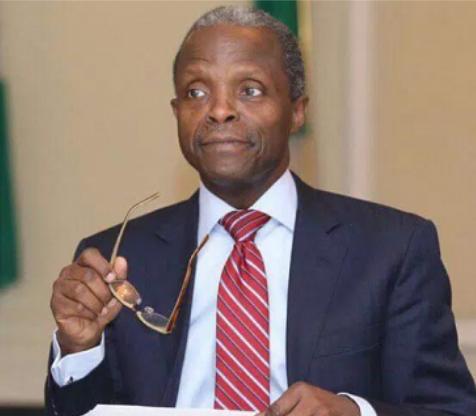Economy
Osinbajo Restates FG’s Commitment to Working with FSP for Economic Growth

Osinbajo made the assertion during the virtual formal launch of EnterpriseNGR on Thursday in Lagos.
He said that the Federal Government would continue to work with the private sector in delivering its growth agenda.
Osinbajo said the Nigerian economy was poised for revitalisation with the launch of the EnterpriseNGR.
Enterprise NGR is a professional policy and advocacy group established with the objective of promoting and advocating for the Financial and Professional Services (“FPS”) sector of Nigeria.
This is with a view to transforming Nigeria into the premier financial services centre in Africa.
“There is no doubt that it is a game changer when the informed Nigerian professionals and business community, speak with one voice on issues of domestic or international business policy.
“EnterpriseNGR, is more ambitious, and has a wider mandate to not only promote the financial and related professional services sector, but also champion the development and transformation of the Nigerian economy,” he said.
According to him, Enterprise NGR will be the leading voice in the transformation of the economy.
He charged the group to take a lead role in making the nation’s business environment more attractive and competitive for both local and foreign investors.
According to him, the EnterpriseNGR initiative which is modeled after similar successful organisations in the United Kingdom (UK) and Singapore, seeks to transform Nigeria into Africa’s foremost centre for financial services.
“There is a need to distinguish slightly that this is a more ambitious initiative and this group has a mandate of championing the transformation of the economy”, Osinbajo said.
Also speaking, the Minister of Finance, Budget and National Planning, Dr Zainab Ahmed, said that government would engage Enterprise NGR to accelerate economic transformation and as well improve business terrain.
“I would like to use this opportunity to reiterate government’s unwaivering support to the private sector, and to also re-emphasise our readiness to ensure that we create an enabling environment where businesses continue to prosper, and innovation is encouraged in Nigeria.
“I’m confident that the private sector initiatives like EnterpriseNGR will go a long way to improve the business terrain in Nigeria.
“Government is keen to work closely with EnterpriseNGR and its advocacy role, representing the broader financial and professional services sector, as we know your success would significantly impact the broader economy.”
“The importance of your sector as a driver of growth cannot be overemphasised and I’m sure that your work will aid in accelerating the economic transformation of our country.
Also speaking, the Minister of Finance, Budget and Planning, Zainab Ahmed, said the government is open to engaging with EnterpriseNGR to aid the acceleration of the country’s economic transformation and improve its business terrain.
Speaking, the Chief Executive Officer, EnterpriseNGR, Ms Obi Ibekwe, noted that the country’s FPS sector needs to be deepened and for that to happen, the Federal Government must work with players in the FPS sector as well as other stakeholders.
Ibekwe noted that the launch of the group was aimed at promoting and advocating for Nigeria’s FPS sector while adding that the group is set to catalyse the revitalisation of the nation’s economy.
EnterpriseNGR is set to launch its inaugural programme the “Youth of Enterprise” internship programme which aims to recruit and onboard more than five thousand interns in its first year and according to Ibekwe, the goal is to place five thousand interns annually and scale this up to one hundred thousand over the next 10 years
“This effort reinforces our determination to contribute our quota toward resolving the unemployment problem in Nigeria.
`Working alongside identified partners in the financial and professional services sector, we will engage and recruit graduates for a combination of virtual and in-person internship roles at partner organisations,” she said.
Ibekwe said the FSP sector is critical to every nation and the backbone of all successful economies.
“High performing economies possess a strong and respected Financial and Professional Services sector, which includes banking & finance, insurance, asset management, capital markets, law, accounting, consulting and fintech.
“The cross-cutting nature of the sector makes it impact all other economic sectors, be it technology, oil & gas, manufacturing.
“There is almost a perfect relationship between the performance of financial services and national growth and development,” Ibekwe said.
Enterprise NGR is positioned to foster a favorable environment for engagement with policy makers and business sector advocacy, both domestically and internationally working in concert with government authorities and other key stakeholders. (NAN)
Economy
Tinubu’s Democracy Speech Reflects Ambitious Vision – LCCI

The Lagos Chamber of Commerce and Industry (LCCI) says President Bola Tinubu’s Democracy Day speech reflects an ambitious and optimistic vision for Nigeria.
In a statement in Lagos on Thursday, the Director-General of LCCI, Dr Chinyere Almona, said the speech showed government’s appreciation of democracy, economic development, security and social cohesion.
Almona said that the President’s focus on economic growth, improving security, and increasing funding for education, healthcare, and infrastructure promised improved economic performance in the near future.
“We join all Nigerians to celebrate the peaceful transition and commitment to democratic values in the past 26 years.
“A stable political environment is very crucial for business success and for attracting investments.
“Government must stay committed to executing all its proposed programmes and ongoing reforms to ensure Nigerians reap the benefits of democracy without further delay,” she said.
The director-general also urged the government to ensure clear and consistent communication about economic reforms and policies to businesses and the general public.
This, she stated, would reduce uncertainty, build confidence and establish transparent mechanisms for tracking and reporting progress made through reforms.
Almona also called for targeted support for businesses to reduce their cost burdens relating to energy, logistics and regulatory compliance.
She said that LCCI recommended non-cash interventions that could ease the harsh production environment.
Almona also advocated expansion of social safety net programmes to support households affected by high living costs and inflation.
She also called for a more collaborative environment among government, businesses, the civil society and labour unions to ensure fair and timely negotiations on wages and working conditions.
She said that the government must implement programmes that would support strategic sectors pivotal to job creation, tax revenues and infrastructure development.
According to her, the oil and gas, power, and agriculture sectors require special attention as they offer catalytic support to the economy.
“As Nigeria reflects on the progress made and the path ahead, we urge government to remain steadfast about implementing all the required reforms toward a more sustainable and resilient economy.
“We call on government to work toward a nation built on the rule of law, justice and social cohesion even in our diversity and political sophistication,” she said. (NAN)
Economy
World Bank Cuts Global Growth Forecast to 2.3% for 2025

Global economic growth is projected to slow to 2.3 per cent in 2025 due to mounting trade tensions and persistent policy uncertainty, according to the World Bank’s latest Global Economic Prospects report.
A statement from the bank’s Online Media Briefing Centre on Tuesday noted that the new forecast was nearly half a percentage point lower than the rate projected at the beginning of the year.
The report indicated that the slowdown would mark the weakest non-recessionary global growth since 2008.
“The turmoil has resulted in growth forecasts being cut in nearly 70 per cent of all economies, across all regions and income groups,” the report states.
In spite of the gloomy outlook, a global recession is not anticipated. However, if current projections hold, average global growth in the first seven years of the 2020s would be the slowest of any decade since the 1960s.
Indermit Gill, the World Bank Group’s Chief Economist and Senior Vice-President for Development Economics, warned of deepening stagnation in the developing world.
“Outside of Asia, the developing world is becoming a development-free zone. It has been advertising itself for more than a decade,” he said.
Gill noted that growth in developing economies had declined steadily, from 6 per cent annually in the 2000s, to 5 per cent in the 2010s, and to under 4 per cent in the 2020s.
This trend mirrored the slowdown in global trade, which fell from an average of 5 per cent in the 2000s to under 3 per cent today. Investment growth had also weakened, while debt had surged to record levels.
The report projected that growth would slow in nearly 60 per cent of developing economies in 2025, averaging 3.8 per cent before a modest rise to 3.9 per cent in 2026 and 2027.
The report added that more than a full percentage point below the average of the 2010s.
“Growth in low-income countries is expected to reach 5.3 per cent in 2025, a 0.4 percentage point downgrade from earlier forecasts.
“Tariff hikes and tight labor markets are expected to keep global inflation elevated, with a projected average of 2.9 per cent in 2025, still above pre-pandemic levels.”
The World Bank warned that slowing growth would hinder efforts by developing economies to create jobs, reduce poverty, and close the income gap with advanced economies.
“Per capita income growth in these economies is forecast at 2.9 per cent in 2025, 1.1 percentage points below the 2000–2019 average.
“Assuming developing countries (excluding China) maintain a GDP growth rate of 4 per cent the forecast for 2027, it would take them about two decades to return to their pre-pandemic growth trajectory.”
Still, the report noted that global growth could rebound more quickly if major economies reduced trade tensions.
It said that resolving current disputes and halving tariffs could boost global growth by 0.2 percentage points over 2025 and 2026.
In response to rising protectionism, the World Bank urged developing economies to diversify trade, pursue strategic partnerships, and engage in regional agreements.
Given constrained public resources and growing development needs, policymakers are encouraged to mobilise domestic revenue, prioritise spending for the most vulnerable, and enhance fiscal management.
To drive sustainable growth, the report emphasised the need to improve business environments, expand productive employment, and align workforce skills with market demands.
Finally, it highlighted the importance of global cooperation in supporting the most vulnerable economies through multilateral initiatives, concessional financing, and targeted relief for countries affected by conflict.(NAN)
Economy
Eid-el-Kabir: Ram Sellers Decry Low Patronage as Prices Soar in Ile-Ife

The Chairman, Ram Sellers’ Association, Odo-Ogbe Market, Ile-Ife, Osun, Alhaji Akeem Salahudeen, has complained of low patronage, attributing it to high cost of rams and the economy situation in the country.
Salahudeen stated this in an interview on Wednesday in Ile-Ife.
He said that the big sized ram which was sold between N550,000 and N620,000 last year are now being sold at the rate of N800,000 to N1.
2 million.He added that the medium sized ram which was sold between N300,000 and N350,000 last year is now going for between N450,000 and N550,000.
According to him, small sized ram sold for N200,000 and N230,000 last year now attracts N300,000 and N450,000 this year.
He attributed the increase in the prices of rams in this year’s Sallah to the insecurity in the North, which he claimed had disrupted the supply chain.
“They said the worsening insecurity in the North has forced some sellers to import rams from neighbouring countries like Niger, Mali and Chad, which they said contributed to the high prices,” he emphasised.
At Sabo Cattle Market in Ile-Ife, Alhaji Saheed Yaro, said that the price of rams has surged as the small sized ram which was sold at N150,000 and N180,000 last year, is now being sold between N250,000 and N350,000.
Yaro added that the price of medium sized ram which was between N185,000 and N260,000 last year now goes for between N350,000 to N450,000.
Accordingly, the big sized ram sold between N480,000 and N500,000 last year is now between N550,000 and N780,000.
At Boosa Cattle Market located at Modakeke, Mr Musa Salami stated that prices of rams have witnessed sharp increase with a medium sized ram which was for N170,000 to N200,000 last year is now at N250,000 to N300,000.
Salami stated further that the big sized ram that was sold at N350,000 and N400,000 is now being sold at N600,000 to N750,000.
He added that he brought 150 rams a week ago, but has been able to sell only 15, explaining that many customers turned back on hearing prices without buying.
He noted that customers who usually bought rams from him over the years are now complaining about costs.
NAN reports that ram sellers expressed concern over low patronage in many markets, saying that customers were lamenting the high cost of the animals.
A civil servant, Mr Bayo Olabisi, said that most workers in the state cannot afford to buy rams for this year’s Eid-el-Kabir due to the high prices and the economic hardship.
Olabisi added that the present economic hardship has been taken a toll on the workers, especially with the high transportation and other costs following the removal of fuel subsidy by the government.
“In fact, I visited three places where they sell rams, but I couldn’t buy any because I can’t afford to buy.
“When I priced a medium sized ram, the seller told me N250,000, the same size of ram I bought for N150,000 last year.
“I would rather use part of my salary to buy half bag of rice and two chickens for my family.
“For Allah has said that if you can’t afford ram, you should not borrow or buy on credit because there’s no reward on that,“ he said. (NAN)




















